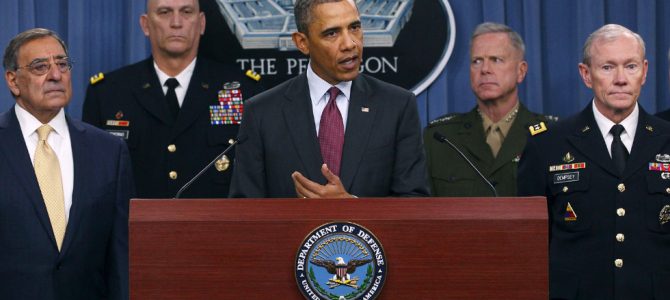Is It Constitutional for a President to Continue the War Without Congressional Support

After President Trump authorized airstrikes in Syria, lawmakers and some pundits questioned his authority, or said he needed congressional approval. Some misunderstood the War Power Resolution, others ignored Article II of the Constitution, and others turned it political by comparing it to President Obama's 2013 decision to seek congressional approval, implying Trump's decision was wrong.
This is not a political article. Instead, it outlines the president's authority to use military force without congressional approval. Historically, presidents have regularly used military force without congressional approval. More recently, that has included President Trump in Syria, President Obama in Libya in 2011, and President Clinton in Kosovo in 1999.
Arguably, all three authorized airstrikes for humanitarian purposes couched in the interest of national security. Using force strictly for humanitarian intervention is not currently a recognized legal basis in the United States, but national security is. Domestically, military force is authorized under the Constitution in three ways: (1) Article I, Section 8 of the Constitution, on when Congress "declares" war; (2) Article 1, Section 8, on when Congress authorizes the use of force; and (3) Article II under the president's inherent commander-in-chief powers.
Declaration of War Versus Authorization to Use Force:
Authorization and declaration are different because they have different legal ramifications. Congress has enacted 11 declarations of war related to five different wars. Ten of the 11 declarations were made based on armed attacks or direct threats against U.S. interests. The other declaration was against Spain in 1898 when Spain refused Cuban independence.
Declaring war creates a state of war. Eight of the declarations use the language "state of war." A state of war has international and domestic legal consequences. Internationally, a state of war replaces a "state of peace," transforming a law of peace into a law of war. With war:
- partnerships are dissolved,
- treaties abrogated,
- commercial relations and all contracts suspended, and
- States can do what is necessary under the law of nature (precepts codified by the Hague and Geneva conventions) to cause the other state to submit to reason and justice.
Domestically, a declaration triggers federal statues that give the president special powers, such as: (1) interdiction of trade, (2) ordering businesses to produce war material, (3) authority over nationals of the enemy state in the United States under the Alien Enemy Act, (4) certain use of electronic surveillance, (5) wide discretion on appointment and reappointment of commanders, and (6) control and command of transportation and communication systems.
Congress has not declared war since 1945, but has authorized the use of military force abroad. A big difference is that authorizations do not trigger the above. They're normally limited in time, space, duration, and objects. Their scope is often broad, though. Interpretations broaden as the inherent powers of the commander-in-chief expand. Congress has also granted wide authorities to presidents from John Adams on.
Article II's Inherent Presidential Powers
While Article I vests in Congress the power to raise armies, appropriate funds to support them, and declare war, Article II vests in the president an inherent authority to conduct U.S. foreign affairs and use military action to protect the national interest as the commander-in-chief.
Historically, congressional consent has not been required when a president exercises Article II powers. President Obama's Office of Legal Counsel (OLC) outlined how Obama had legal authority to use force in Libya without congressional authorization. Relying on past OLC opinions regarding Somalia and Haiti, the OLC said the president had authority to use military action as commander-in-chief for national security and foreign military affairs. Obama's OLC went further to say two centuries of history confirms presidential authority to use military force absent Congress (quoting "Presidential Power," 4A Op. O.L.C.).
In 1999, President Clinton relied on constitutional authority when he authorized an air campaign in Kosovo without congressional approval. He relied on his U.S. foreign relations, commander-in-chief, and chief executive authority. There was concern he violated the War Power Resolution (WPR) given the duration of military action.
The WPR requires the president to (1) consult with Congress before introducing armed forces into hostilities or imminent threat and (2) submit a written report to Congress within 48 hours of deploying U.S. forces into hostilities or a foreign nation. Within 60 days the president is required to withdraw forces unless Congress declares war, extends the 60 days, or is unable to meet the 60-day withdrawal because of an armed attack on the United States.
Members of Congress said President Clinton violated the WPR because airstrikes against Serbian forces went beyond 60 days. Twenty-six members sued, but a federal judge ruled Clinton's actions were lawful.
National Security and Humanitarian Intervention
After Syrian President Bashar Assad used chemical weapons in 2013, the United Kingdom recognized humanitarian intervention as a legal basis to use military action. Likewise, Clinton, Obama, and Trump all expressed humanitarian reasons to authorize military action. However, their administrations tied their actual authority to use force to national security interests. This is because using force for humanitarian intervention is not recognized as a lawful basis by U.S. law. Trump's national security basis for Syria was to prevent and deter the spread of chemical weapons.
Some will insist that presidents must obtain Congress' blessing prior to any military use of force. This debate won't end. What we do know is that presidents have relied on their Article II powers to use force overseas, and their attorneys have argued that the Constitution authorizes them to do so. Historical and legal precedent is seemingly established. To do so, the presidents must claim a nexus between their use of this force and national security interests.
Source: https://thefederalist.com/2017/05/04/rules-presidents-can-use-military-force-without-asking-congress/

0 Response to "Is It Constitutional for a President to Continue the War Without Congressional Support"
Post a Comment